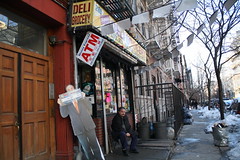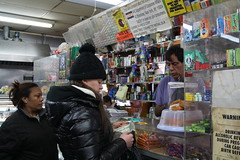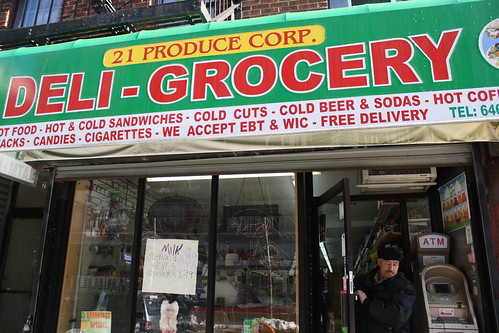Mexican music recently filled the 21 Produce Corp. Deli and Grocery on Avenue B near Second Street in the East Village. But on a recent Thursday afternoon there was no one in the store to buy the corn tortillas, cigarettes and other staples of this corner bodega.
“We’re already losing a lot of businesses due to increases in rent and if it keeps going on like this, we won’t be in business much longer,” Geodoro Hernandez, 55, who works the counter at 21 Produce Corp., said as he gazed around the empty store.
The desolate scene at 21 Produce is a stark example of how small, neighborhood grocery and convenience stores are struggling to stay afloat in a rough economy. Retail groups and other industry experts say that a combination of forces, including high rents and competition from larger, more upscale markets, have placed the future of many bodegas in jeopardy.
In a recent survey of the city’s bodega owners, roughly half said that their businesses are at risk of closing. The cause? Nearly three-quarters cited rising rents.
The CPEX Fall 2010 Retail Report showed an increase in the average rent per square foot in the East Village to $225-350. In 2005, small businesses paid an average of $150.
“Bodegas are a dying breed,” said Lisa Kaplan, chief of staff for City Councilwoman, Rosie Mendez. “The fact that the chains and pharmacies are carrying more products that bodegas used to sell, is adding greatly to the pressure.”
According to the 2008-2009 New York City Hispanic Small Business Survey, 53 percent of bodegas are at risk of closing. Of the 937 Latino-owned bodega owners surveyed, 74 percent blamed high rents and 18 percent said they were unable to compete with larger franchise stores.
The East Village Community Coalition, a non-profit that works to support and sustain the cultural character of the East Village, has called for new zoning regulations in the neighborhood, which would limit the kinds of chain retail stores that could come to the neighborhood.
 Amanda Plasencia A patron sits outside Jahanara Deli & Grocery on Avenue D and Seventh Street. Roughly half of all bodega owners in the city said in a recent survey that their businesses were in danger of closing.
Amanda Plasencia A patron sits outside Jahanara Deli & Grocery on Avenue D and Seventh Street. Roughly half of all bodega owners in the city said in a recent survey that their businesses were in danger of closing.“We have an interesting, unique community here and we don’t want to lose that to Starbucks and McDonald’s and the same old things you’d see from here to Topeka, Kan.,” said Kurt Cavanaugh, managing director of the coalition.
Many East Village grocers say that they already feel overburdened in these tough times and for some, chain grocery stores only add fuel to the fire.
“It’s a difficult situation,” said Fernando Fernandez, 51, of Ave. D Corporation Deli & Grocery. “There are much more costs nowadays and we’re not prepared for these big businesses to come in.”
According to the Center for an Urban Future, a public policy organization that works to target problems facing low-income and working class neighborhoods in New York City, the East Village has seen a 9.93 percent growth of national retail chains from 2009 to 2010. The East Village has the second greatest number of retail chain stores of any neighborhood in New York City; Koreatown has the most.
Besides high-end stores, bodegas are also faced with the economic forces of gentrification.
“People that are younger and wealthy are moving into the neighborhood and you look at the buildings on Houston and they’re all glassy, pretty condos, but they’re not affordable for most people,” Mr. Cavanaugh said. “What stems from that is, you get the Whole Foods and the nice organic markets that come in.”
Some bodega owners have tried to adapt to the changing nature of the market. At the corner of Seventh Street and Avenue C, an E&S Wholesome Foods now occupies the space where another bodega, the Joe Grocery, once stood. E&S sells organic products in addition to run of the mill bodega fare like beers, sodas, snacks, and sandwiches.
The new shop, which also has a location at Essex and Stanton Streets, is more expensive than Joe’s.
 Amanda Plasencia Fernando Fernandez, 51, works the counter at Ave. D Corporation Deli & Grocery in the East Village. He said that his business has been struggling because he cannot compete with the large chain grocery stores that keep moving into the neighborhood.
Amanda Plasencia Fernando Fernandez, 51, works the counter at Ave. D Corporation Deli & Grocery in the East Village. He said that his business has been struggling because he cannot compete with the large chain grocery stores that keep moving into the neighborhood.Orlando Rodriguez, a co-owner of E&S, said the same restaurant and bar scene in the East Village gives him confidence in the future for the new bodega.
“Restaurants and clubs will be good for the business I think,” Mr. Rodriguez said. “We knew this location had potential for a long time and the neighborhood is really getting there.”
Mr. Rodriguez has placed a bet that the neighborhood is ready for a store that caters to the all-natural niche.
“We’re bringing a new flavor to the neighborhood that it needs and wants,” Mr. Rodriguez said. “Now, you need to walk as far as Avenue A for food like this.”
Less than a block away Yankee Deli has received a makeover, too, including a new sign that promises natural foods. Owners Jose Collado and Rad Almonte operate another Yankee Deli location on 11th Street and Avenue C that features a new look.
“It was looking too old,” Mr. Almonte said. “The neighborhood is changing and we are bringing a new energy and new feeling for the people.”
Echoing Mr. Rodriguez, Mr. Almonte said he thinks the new face will bring more business. He added that the prices of existing products will remain the same, but the shop will be upgraded with new goods that might cost more.
Not every business, however, is able to afford the cost of keeping up with the new market. On Jan. 22, 2010, Ramon Murphy, president of The Bodegas Association of the United States, wrote to the New York Senate Standing Committee on Health to plead for the well being of the entity he represents.
He argued against a proposed soda tax, suggesting that such a tax might send many of his fellow bodega owners over the edge of bankruptcy and force them to shutter their businesses for good.
“Last year, 137 of them went down just along Broadway from 230th St. to 197th Street,” Mr. Murphy wrote in a letter to the Senate. “Everyday, bodegas are shutting down in New York City.”




